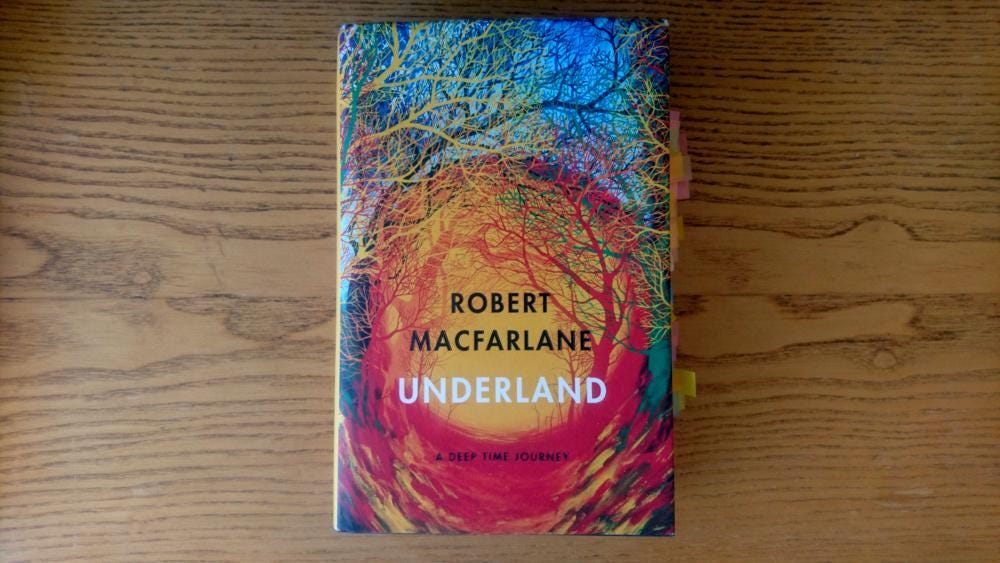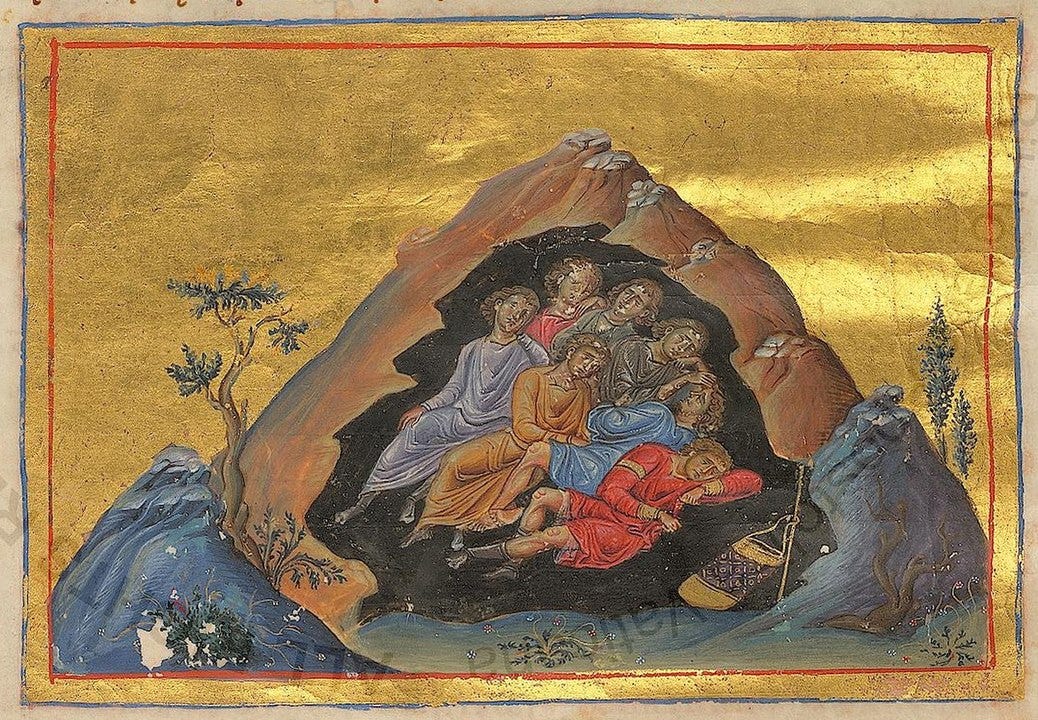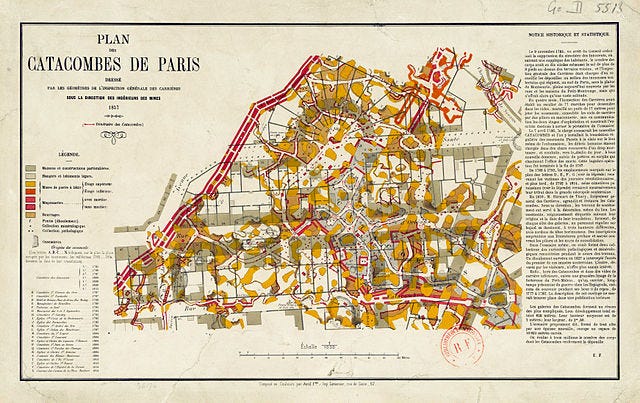FIRST LINE
The way into the underland is through the riven trunk of an old ash tree.

FROM THE BLURB
Underland is an epic exploration of the Earth’s underworlds as they exist in myth, literature, memory and the land itself. … Robert Macfarlane takes us on an extraordinary voyage into our relationship with darkness, burial, and our planet’s past and future.
EXCERPTS
It’s feels futile to print only five excerpts when I’ve marked twenty-nine, but there we go. You’ll just have to buy the book.
1. What will survive of us?
Philip Larkin famously proposed that what will survive of us is love. Wrong. What will survive of us is plastic, swine bones and lead-207, the stable isotrope at the end of the uranium-235 decay chain.
2. Fungi and lichen superheroes
‘My childhood superheroes weren’t Marvel characters,’ Merlin [Sheldrake] once said to me, ‘they were lichens and fungi. Fungi and lichen annihilate our categories of gender. They reshape our ideas of community and cooperation. They screw up our hereditary model of evolutionary descent. They utterly liquidate our notions of time. Lichens can crumble rocks into dust with terrifying acids. Fungi can exude massively powerful enzymes outside their bodies that dissolve soil. They’re the biggest organisms in the world and among the oldest. They’re world-makers and world-breakers. What’s more superhero than that?’
3. Occulting landscapes
Dissonance is produced by any landscape that enchants in the present but has been a site of violence in the past. But to read such a place only for its dark histories is to disallow its possibilities for future life, to deny reparation or hope — and this is another kind of oppression. If there is a way of seeing such landscapes, it might be thought of as ‘occulting’: the nautical term for a light that flashes on and off, and in which the periods of illumination are longer than the periods of darkness. … [T]hese landscapes offer the reassurance of nature’s return [and] incite the discord of profound suffering coexisting with generous life.
4. Living on the Internet
I realise how configured my sense of distance has become from living so much on the Internet, where everything is in reach and nothing is within touch.
5. A language of hope
The idea of the Anthropocene repeatedly strikes us dumb. In the complexity of its structures and the range of its scales within time and space — from nanometric to the planetary, from picoseconds to aeons — the Anthropocene confronts us with huge challenges. How to interpret, or even refer to it? Its energies are interactive, its properties emergent and its structures are withdrawn. We find speaking of the Anthropocene, even speaking in the Anthropocene, difficult. It is, perhaps, best imagined as an epoch of loss — of species, places and people — for which we are seeking a language of grief and, even harder to find, a language of hope.
NEW WORDS
Definitions are from the Oxford English Dictionary, unless otherwise noted.
Swallet
An underground stream of water such as breaks in upon miners at work.
Aftermath
A second crop or new growth of grass (or occasionally another plant used as feed) after the first has been mown or harvested.
Stridulations
The harsh, grating, shrill noises produced by certain insects (in this case, R.F. is describing a grasshopper).
Scintillation
Astronomy. Originally: the twinkling or tremulous motion of stars, caused by the atmosphere diffracting starlight unevenly. In later use also: a similar effect with other light sources or celestial objects observed or detected through a gaseous medium or a plasma.
Puhpowee
From the Native American language Potawatomi: ‘the force which causes mushrooms to push up from the earth overnight’.
Menologion
Orthodox Church. A hagiographical collection of a type compiled in the Byzantine Empire from the 9th cent. onwards, in which the saints’ lives, usually of substantial length and often interspersed with homilies or verses, are arranged in the order of the dates on which their subjects are commemorated.

Above: illuminated manuscript of the Seven Sleepers of Ephesus (aṣḥāb al kahf), from the Menologion of Basil II. Wikimedia Commons.
Soteriology
Theology. The doctrine of salvation.
Solastagia
Defined in Underland as:
[T]he term coined by Glenn Albrecht in 2003 to mean a ‘form of psychic or existential distress caused by environmental change’.
Plastiglomerate
Defined in Underland as:
[A] hard coagulate that contains sand grain, shells, wood and seaweed, all held together by molten plastic produced by the human burning of beach rubbish on campfires. Plastiglomerate was first identified by geologists on Kamilo Beach in Hawaii; it has been proposed — due to its durability and distinctive composition — as a plausible future Anthropocene strata horizon marker.
Nacreous
Pearly or iridescent like nacre (mother-of-pearl).
Orogeny
The process by which mountains are formed.
NEW CONCEPTS
The description of these concepts are all excised from Underland.
Crown shyness
[I]ndividual forest trees respect each other’s space, leaving slender gaps between the end of one tree’s outermost leaves and the start of another’s.
Species loneliness
[T]he intense solitude that we are fashioning for ourselves as we strip the Earth of other life with which we share it.
Autochthonous rights
After Pamela Ballinger: the battle for the right to claim authentically to ‘belong’ to a given area of land, rock and soil.
Humans as holobionts
The work of radical biologist Lynn Margulis and others has shown humans to be not solitary beings, but what Margulis memorably calls ‘holobionts’ — collaborative compound organisms, ecological units ‘consisting of trillions of bacteria, viruses and fungi that coordinate the task of living together and sharing a common life’, in the philosopher Glenn Albrecht’s phrase.
The vertical city
Just as a mountain does not end at its summit or its foothills, but extends instead into the weather it creates in the air above it, and the orogeny of the rocks that have raised it, so a city does not cease either at its foundations or the spires of its tallest buildings. … Pierre Bélanger estimates that the ‘infrastructure that supports urban life’ now spans from ‘10,000 metres below the sea to 35,000 km above the surface of the earth’.
Thick speech
The cultural theorist Sianne Ngai suggests that, when shocked or grieving, we find ourselves able to speak of the experience only in ‘thick speech’. When speaking thickly, Ngai says, we are challenged in our usual ability to ‘interpret or respond’. … Tenses work against one another. There is a ‘backflowing’, a loss of causal drive, a gathering of hesitancies and stutters.
WHERE NEXT?
A few of the many poems, articles, books and places that went into making Underland.
Birches by Robert Frost
Exploring How and Why Trees ‘Talk’ to Each Other by Suzanne Simard
Arts of Inclusion, or, How to Love a Mushroom by Anna Tsing
Passagen-Werk (Arcades Project) by Walter Benjamin
Paris is built over a system of caverns … this great technological system of tunnels and thoroughfares interconnects with the ancient vaults, the limestone quarries, the grottoes and the catacombs which, since the early Middle Ages, have time and again been entered and traversed.
The catacombs of Paris or Odessa (1,500 miles of tunnels on three levels).

Above: Plan des Catacombs de Paris, Inspection Générale des Carrières, 1857. Wikimedia Commons.
Le Passe-Muraille Sculpture in Montmartre, Paris.
Crack the Surface, a video series on urban exploration.
Hollow Land: Israel’s Architecture of Occupation by Eyal Weizman
Exiting The Anthropocene and Entering The Symbiocene by Glenn Albrecht
LAST LINE
I reach my hand towards his and meet it palm to palm, finger to finger, his skin strange as stone against mine.
END MATTER
Underland, among the most rewarding books I’ve ever read, was a beautiful gift from T.D. — thanks!
425 pages, ~165,000 words
Read: 14 August 2019 to 4 March 2020 (204 days — somewhat interrupted for four months by Thighs of Steel and then that thing called Christmas)
CREDITS
David Charles wrote this. He publishes another newsletter about the overlooked corners of our world called, humbly, The David Charles Newsletter. David is co-writer of BBC Radio Wales sitcom Foiled, and writes for The Bike Project, Forests News, Global Landscape Forum, Elevate and Thighs of Steel. He also edits books about adventure, activism and more. Reply to this email, or discover more on davidcharles.info. Thank you for reading!


